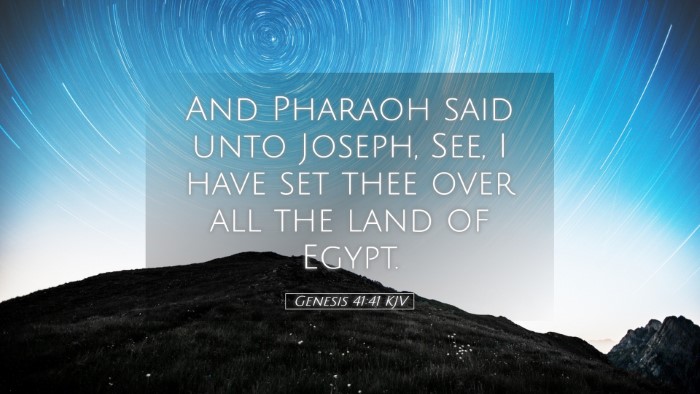Commentary on Genesis 41:41
Verse Context: Genesis 41:41 states, "And Pharaoh said unto Joseph, See, I have set thee over all the land of Egypt." This verse marks a pivotal moment in the narrative of Joseph, illustrating the culmination of his trials and the elevation of his status from a prisoner to a position of significant authority.
Historical and Theological Significance
Joseph's elevation to power serves not only as a personal deliverance but also as a divine orchestration within the broader framework of God's redemptive plan. It highlights themes of providence, mercy, and divine favor which are recurrent throughout Scripture.
Matthew Henry's Commentary
Divine Purpose in Promotion: Matthew Henry emphasizes that the promotion of Joseph showcases God's purpose even in suffering. He notes, "When God intends to do good to His people, He raises up instruments for their deliverance." This elevation, from a pit to a palace, illustrates how God works through circumstances to fulfill His plans.
Character Development: Henry suggests that Joseph's character, forged through trials, prepared him to handle the responsibilities bestowed upon him. His humility and integrity, displayed through his previous experiences, are essential qualities that equipped him for leadership.
Preparation for Future Challenges: Henry also remarks on the importance of this moment in preparation for the impending famine, indicating that God provides not only for immediate needs but also prepares His people for future challenges.
Albert Barnes' Insights
Pharaoh's Decision: Albert Barnes highlights that Pharaoh's declaration reflects a sovereign act of divine governance. He remarks, "Pharaoh's decision was not merely a political move; it revealed God's hand at work in the affairs of men." This emphasizes the seamless coordination between human authority and divine will.
Symbol of Authority: Barnes notes that being set over all the land is not just about authority, but also about responsibility. He states, "With power comes the obligation to serve; Joseph was given authority to benefit the nation during a time of need." This insight highlights the ethical dimensions of leadership.
Joseph as a Type of Christ: Barnes also draws attention to Joseph's role as a foreshadowing of Christ. He observes that just as Joseph was appointed to save Egypt, Christ is appointed to save humanity, thus revealing God’s plan for salvation through appointed leaders.
Adam Clarke's Exegesis
The Role of Providence: Adam Clarke elaborates on the providence of God in Joseph’s rise to power, stating, "Joseph's advancement was a clear demonstration that God governs the affairs of men and places those in power whom He deems fit." This understanding fortifies the belief that God has a unique plan for His people.
Joseph’s Wisdom: Clarke praises Joseph's wisdom and understanding, stressing that his experiences in Potiphar's house and prison were not in vain. He asserts, "God shaped Joseph’s character through trials, ultimately making him a suitable leader." This underscores the importance of spiritual and moral growth through adversity.
Impact of Joseph’s Rise: Clarke also indicates that this moment set the stage for the future of Israel, as Joseph’s administration would provide for his brothers during the famine, highlighting the interconnectedness of God’s plan for various generations.
Theological Implications
The implications of Joseph's rise not only resonate with personal faith journeys but also speak to the broader issues of justice, mercy, and divine orchestration in governance. This moment underlines how God uses individuals in positions of power to bring about His will and serve the community.
- God's Sovereignty: This narrative powerfully illustrates that God is sovereign over history and human affairs.
- Leadership as Service: Joseph's position exemplifies that true leadership is marked by servanthood, a principle that runs through both the Old and New Testaments.
- Prophetic Fulfillment: Joseph’s story fulfills the prophetic dreams he had, showcasing that God’s promises are steadfast, even through trials.
Practical Applications for Ministry
For pastors and theologians, the commentary on Genesis 41:41 encourages reflection on the following:
- Encourage perseverance: As Joseph was tested, so too will believers face trials. Emphasizing God's faithfulness can inspire hope amidst hardships.
- Highlighting Divine Providence: Teaching on God's providence in the lives of believers can cultivate trust in His plan.
- Responsible Leadership: Engaging with the ethical aspects of leadership as modeled by Joseph can foster discussions about character in ministry and governance.


